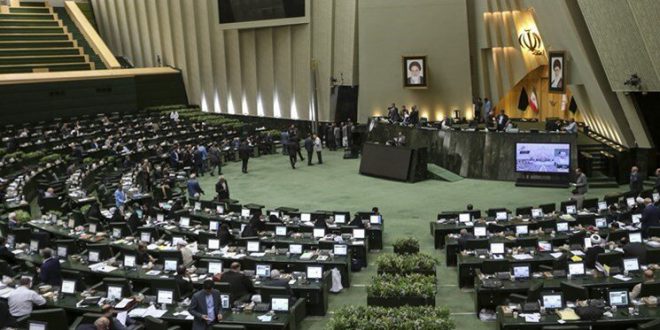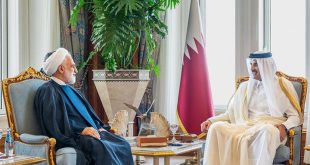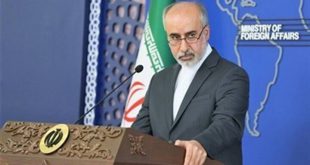Iranian
lawmakers on Sunday urged President Ebrahim Raisi to obtain guarantees from the U.S. and three European countries that they won’t withdraw from another agreement as talks underway in Vienna to return Washington to compliance and remove sanctions on Tehran are reportedly drawing to a close.
Negotiators from Iran and the remaining parties to the agreement — Britain, France, Germany, Russia and China — are working to restore life to the 2015 accord, which collapsed after the United Stated abandoned it in 2018.
President Joe Biden has signaled that he wants to rejoin the deal, but he is showing little sign of ditching his predecessor’s coercive policies.
Iranian lawmakers laid out six conditions for the revival of the deal in a letter to President Raisi published on Sunday, official IRNA news agency reported.
The letter, signed by 250 out of 290 parliamentarians, stated that U.S. and European parties should guarantee that they would not exit a restored agreement, nor trigger the “snapback mechanism” under which sanctions on Iran would be immediately reinstated if the next government opened to quit it again.
“We have to learn a lesson from past experiences and put a red line on the national interest by not committing to any agreement without obtaining necessary guarantees first,” lawmakers said in the letter.
The letter also said a return to the deal should only go ahead if all sanctions were removed, including those pertaining to terrorism, missile technology and human rights.
In addition, lawmakers first want to confirm that Iran receives money from its exports, before the government returns to nuclear compliance, the statement added.
After 10 months of talks in Vienna, one of the remaining differences is Iran’s demand for a U.S. guarantee of no more sanctions or other punitive steps in the future.
Iranian Foreign Minister Hussein
Amir-Abdollahian said on Saturday that a joint statement by the heads of the U.S. Senate and House of Representatives to back the nuclear deal would suffice as a “political guarantee”.
German Chancellor Olaf Scholz told participants at the annual Munich Security Conference on Saturday that the talks have come a long way over the past 10 months and “all elements for a conclusion of the negotiations are on the table.”
Amir-Abdollahian said that it’s up to Western countries to show flexibility and “the ball is now in their court.”
In an interview with CNN on the sidelines of the 58th Munich Security Conference (MSC) in Munich, he said the responsibility for a possible failure of the Vienna talks rests solely with the West, and the United States in particular, as the Islamic Republic has invariably demonstrated it is prepared to settle all issues.
President Raisi, he said, has the serious will to achieve a good deal with the other side.
“Now, we are at a very sensitive time and the other side should be realistic; and if the talks fail, we believe that it is the Americans and the other side that are responsible for it,” he said.
“The Islamic Republic of Iran has shown its seriousness and has shown that it really wants the deal to be done and we have been trying to reach the deal.”
Amir-Abdollahian also met EU foreign policy chief Josep Borrell and stressed the need for the West to take necessary political decisions so that an agreement could be reached in the shortest possible time.
“If it were not for Iran’s initiatives, we would not be so close to an agreement,” he said. “But the other side should know that Tehran will not ignore its red lines.”
Separately, Amir-Abdollahian was asked about the possibility of direct talks between the Iranian and American delegations in Vienna.
“In recent weeks, the Americans have been asking through various intermediaries to negotiate directly with us. In response to the mediators, we stated that the prospects for such negotiations were not very clear to us, and if we were not to achieve anything, there was no need for direct talks. If the American side takes a major initiative, including the lifting of some sanctions, then it can be said that the U.S. intentions are real,” the top Iranian diplomat said.
“We hear from the Americans that Mr. Biden has good faith,” Amir-Abdollahian said, stressing that he had stated in meetings on the sidelined of the 76th Session of the UN General Assembly in New York in September that if the U.S. president had good faith, then he would release $10 billion of Iran’s frozen assets in foreign banks.
“We do not ask Mr. Biden for a loan or funds, but we want him to release our assets in good faith,” he said.
Amir-Abdollahian said the American side speaks of good faith only in words and that is not enough for direct talks.
“They must show their goodwill in a practical way and on the ground; they can lift some of the sanctions or release some of our frozen assets in foreign banks.”
The top diplomat said with the new round of talks underway, “even some new sanctions have been imposed on Iranian legal and natural persons by the Biden administration”.
“This means that his government is following in Trump’s footsteps, so public opinion believes that they are practically the same.”

 صراط عشق صراط عشق
صراط عشق صراط عشق



